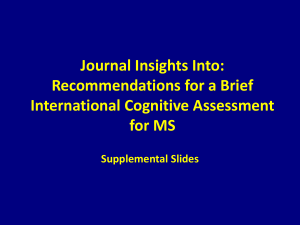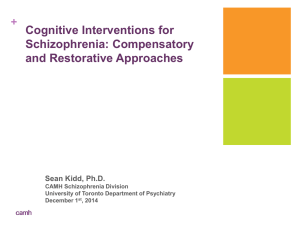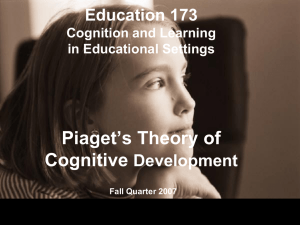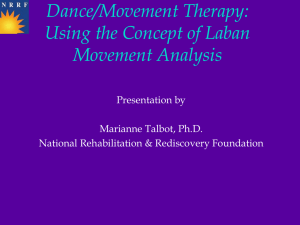Cognitive Remediation in Severe Mental Illness
advertisement
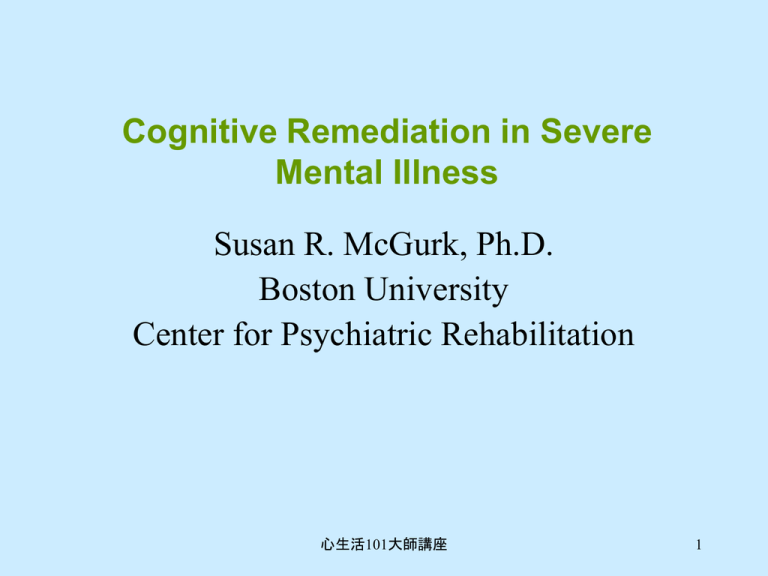
Cognitive Remediation in Severe Mental Illness Susan R. McGurk, Ph.D. Boston University Center for Psychiatric Rehabilitation 心生活101大師講座 1 Outline Part I: Rationale for the Use of Cognitive Remediation in Severe Mental Illness Part II: Current Methods of Cognitive Remediation in Severe Mental Illness Part III: Principles of Supported Employment Part IV: Rationale for Combining Cognitive Remediation and Supported Employment Part V: Overview of the Thinking Skills for Work Program Part VI: Summary 心生活101大師講座 2 Outline Part I: Rationale for the Use of Cognitive Remediation in Severe Mental Illness 心生活101大師講座 3 What is Cognition Functioning? • Mental processes • Five major areas – Attention – Psychomotor speed – Memory – Problem-solving – Social cognition 心生活101大師講座 4 BACS Tower of London How many moves does it take to make A look like B? Answer: 2 BACS, 2000 心生活101大師講座 5 Social Cognition • Ability to perceive and understand relevant social cues: – Facial expression & voice tone – Hints and indirect suggestions – Social norms (e.g., difference between a coworker and friend) – Rules of personal disclosure (i.e., gradually increase level of disclosure, matched to other person’s level) 心生活101大師講座 6 FEDT • Facial Emotion Discrimination Task (FEDT; Kerr & Neale, 1993) – 30 pairs of pictures, faces expressing emotions – Are both faces expressing same emotion? 心生活101大師講座 7 Why is Cognitive Functioning Important in Psychiatric Illness? • Cognitive impairments are common in severe mental illness (SMI) • Cognitive impairments increase the risk of developing SMI 心生活101大師講座 8 Why is Cognitive Functioning Important in Psychiatric Illness? • Related to a broad range of functioning (such as self-care and independent living, social relationships, work) 心生活101大師講座 9 Why is Cognitive Functioning Important in Psychiatric Illness? • Cognitive impairment is associated with less benefit from psychiatric rehabilitation 心生活101大師講座 10 Improvement in Global Assertiveness of Social Skill (Mueser et al., 1991) Global Assertiveness 3.7 Memory 3.43 3.16 Good Poor 2.89 2.62 2.35 Pre Post Followup Social Skill Training 心生活101大師講座 11 Why is Cognitive Functioning Important in Psychiatric Illness? • Patients are aware of having cognitive problems and are distressed by them 心生活101大師講座 12 Subjective Reports of Cognitive Impairment • “I have something I want to say and then it flies right out of my mind before I say it.” • “I forgot what I was supposed to do today at work. My boss got really annoyed with me.” • In class, my mind wanders fairly frequently and it’s upsetting. When I’m reading for school, my mind wanders- I would have to reread the sections several times.” • “I tend to repeat myself, do things over and over; I forget what my friends tell me. I forget where I put things. I forget about medications.” 心生活101大師講座 13 Part II: Current Methods of Cognitive Remediation in Severe Mental Illness 心生活101大師講座 14 What is Cognitive Remediation? • No widely accepted definition “Cognitive remediation therapy for schizophrenia is a behavioural training based intervention that aims to improve cognitive processes (attention, memory, executive function, social cognition or metacognition) with the goal of durability and generalisation” (Cognitive Remediation Expert Working Group) 心生活101大師講座 15 Cognitive Remediation Programs • Attempts to improve cognitive functioning in schizophrenia have a lengthy history (40+ years) • Cognitive remediation approaches, some adapted from treatment of traumatic brain injury, involve a variety of methods, such as computer based or paper and pencil rote practice, strategy coaching, and groupbased practice approaches 心生活101大師講座 16 Cognitive Remediation Programs • Range of intensity and duration of programs: –3 to 75 hours –1 to 5 hours per week • The “average” program provides about 20 hours of practice delivered over about 16 weeks. 心生活101大師講座 17 Computerized Cognitive Remediation Software Orientation Remediation Module (Ben-Yishay, 1986; Medalia, 1998) Captain’s Log Software (Sandford and Browne, 1988; Burda et al., 1994’ Belluci, et al., 2002;) PSS CogRehab (Bracy, 1995’; Hogarty et al., 1999, 2004; Bell et al., 2001; Wexler and Bell, 2005; Greig et al., 2007) COGPACK (Marker Software, 1988; Sartory et al., 2005; McGurk et al., 2005; Vauth et al., 2005; Rauchensteiner, 2010) PositScience (Fisher et al., 2009, 2010) 心生活101大師講座 18 心生活101大師講座 19 心生活101大師講座 20 Cognitive Remediation Methods • Some programs supplement task practice with strategy coaching, designed to help participants improve exercise performance • Strategy coaching is usually provided by the program facilitator, although some computer programs also prompt use of specific strategies 心生活101大師講座 21 Cognitive Remediation Methods • Compensatory Strategies: Strategies that are taught with the main purpose of reducing the problem caused by the cognitive difficulty without directly affecting the cognitive area itself. 心生活101大師講座 22 心生活101大師講座 23 Relationship to Other Psychiatric Rehabilitation Services • Many cognitive remediation are “stand alone” programs • Some programs are provided with other psychosocial rehabilitation approaches • The structure of combined programs varies, with approaches including staged, parallel, and/or integrated delivery. 心生活101大師講座 24 Effectiveness of Cognitive Remediation • First meta-analysis involving sufficient studies to evaluate effects on psychosocial functioning: (McGurk, Twamley, Sitzer, Wolfe, Mueser(2007)) • 26 studies • 1151 clients • Examined effects on cognitive functioning, symptoms, psychosocial functioning • Explored moderators of outcome, including characteristics of consumers & cognitive remediation programs, and provision of adjunctive psychiatric rehabilitation 心生活101大師講座 25 心生活101大師講座 26 心生活101大師講座 27 Summary of Meta Analysis • A newer, more rigorous meta analysis has been completed with 40 randomized controlled trials with attention to rating methodological rigor of the studies (Wykes, Huddy, Cellard, McGurk, Czobar, 2011). • How similar are the effects of the updated analysis on the same outcomes (cognition, symptoms, functional outcomes) reported in the 2007 meta analysis? 心生活101大師講座 28 Comparative Effect Sizes Between McGurk et al. (2007) & Wykes, et al. (2011) 0.5 0.45 0.4 0.35 0.3 0.25 0.2 0.15 0.1 0.05 0 McGurk et al. Wykes et al. Overall Cognition Symptoms Functioning 心生活101大師講座 29 Adjunctive Psychosocial Rehabilitation as a Moderator of Functional Outcomes 0.7 0.6 0.5 0.4 Adjunctive No Adjunctive 0.3 0.2 0.1 0 McGurk et al. Wykes et al. 心生活101大師講座 30 How does Cognitive Remediation Improve Outcomes of Psychiatric Functioning? • All rehabilitation programs, including vocational rehabilitation, involve some kind of learning • People with compromised cognitive functioning learn more slowly and benefit less from psychiatric rehabilitation • Improved cognitive functioning produced by cognitive remediation may benefit the capacity to learn new skills and result in increased benefit from psychiatric rehabilitation programs. 心生活101大師講座 31 Summary • A more rigorous meta analysis indicated similar effects overall, with somewhat stronger effects on overall cognitive functioning and on functional outcomes, and somewhat weaker effects on symptoms • Of particular interest is the replication of adjunctive psychiatric rehabilitation as a moderator of functional outcomes. • Current results suggest combining cognitive and psychosocial rehabilitation may help those who did not previously benefit from psychosocial practices alone, or serve to create a stronger response overall. 心生活101大師講座 32 “Extended” Cognitive Remediation Definition “Cognitive remediation is an intervention targeting cognitive deficit using scientific principles of learning with the ultimate goal of improving functional outcomes. Its effectiveness is enhanced when provided in a context (formal or informal) that provides support and opportunity for extending everyday functioning.” (Cognitive Remediation Therapy Expert Working Group; SIRS meeting, 2012) 心生活101大師講座 33 Rationale for Integrating Cognitive Remediation and Supported Employment Research on relationship between cognitive functioning and work outcomes in severe mental illness shows that: - Better cognitive functioning contributes to better employment outcomes - Better cognitive functioning results in greater improvement in psychiatric rehabilitation, including vocational rehabilitation (e.g., supported employment) 心生活101大師講座 34 Part III: Principles of Supported Employment 心生活101大師講座 35 Importance of Work • Most persons with SMI say they want to work • Rates of competitive work are very low in SMI • Work is associated with modest benefits in financial standing, self-esteem, symptoms, and life satisfaction • Work is destigmatizing, both in terms of selfstigma and social stigma 心生活101大師講座 36 Supported Employment Focus on “real” jobs in the community paying competitive wages Minimal pre-vocational assessment and no prevocational skills training Rapid job search Attention to client preferences Follow along supports, as many and as long as needed Organizational linkage between mental health and employment services Figure 1. Competitive Employment Rates in 16 Randomized Controlled Trials of Supported Employment 90% 80% 70% 60% 50% 40% 30% 20% 10% 0% 96 NH (IPS) 07 Aust (IPS) 94 NY (SE) 07 IL (IPS) 04 CT (IPS) 05 HK (IPS) 06 SC (IPS) Supported Employment 06 MA (ACT) 99 DC (IPS) Control 07 CA (IPS) 95 IN (SE) Control 2 07 EUR (IPS) 06 QUE (IPS) 00 NY (SE) 97 CA (SE) 02 MD (IPS) Limitations of Supported Employment • About one-half of clients work little or not at all • Between 41%-77% of consumers end their jobs within 6 months • The average job tenure is about 3 months • Most job endings are unsatisfactory (e.g., fired, walked off job without other job) 心生活101大師講座 39 Part IV:Rationale for Integrating Cognitive Remediation in Vocational Rehabilitation 心生活101大師講座 40 Cognitive Functioning and Employment - Cognitive functioning is strongly related to work outcomes in schizophrenia - Research has shown that cognitive functioning: • Better in employed than unemployed clients • Better in clients with a good work history than a poor work history • Predicts employment in general SMI populations • Predicts vocational outcomes in people in vocational rehabilitation, including supported employment 心生活101大師講座 41 Common Work Problems Related to Impaired Cognitive Functioning 1. 2. 3. 4. 5. 6. 7. 8. Slowness Poor quality of work (e.g., making mistakes) Forgetting Poor problem solving Lower stamina/Problems with fatigue Being late Not paying attention Disorganization 心生活101大師講座 42 Common Work Problems often Related to Cognition (cont.) 9. 10. 11. 12. 13. 14. 15. 16. Talking too much about personal issues Asking unnecessary questions Difficulties socializing with other co-workers Poor concentration Inaccurate perceptions about work situations Emotion regulation difficulties at work Not setting boundaries Taking unscheduled breaks 心生活101大師講座 43 Interim Summary • Cognitive impairment is common in severe mental illness • Cognitive difficulties interfere with work • Support employment is an evidence-based practice in helping people with SMI achieve work goals • A significant subgroup of enrollees fail to receive the full benefits of SE • Cognitive remediation improves thinking skills in SMI • Cognitive remediation has broader, functional benefits when paired with psychiatric rehabilitation, such as vocational rehabilitation 心生活101大師講座 44 Part V: Overview of the Thinking Skills for Work Program 心生活101大師講座 45 The Thinking Skills for Work Program • Designed for clients with poor work history or who are not benefiting from supported employment • Fully integrated with supported employment or other vocational program • Combines computer cognitive training with learning coping and compensatory skills • Is implemented by cognitive specialist who is member of vocational team 心生活101大師講座 46 Components of the Program • • • • Assessment Computer cognitive training Job search planning Job support consultation 心生活101大師講座 47 Elements of Thinking Skills for Work Program Assessment : determine persons’ array of cognitive strengths and weaknesses; Cognitive Remediation: improve cognitive skills through focused computerized practice; Job Search Planning: anticipate the need for coping strategies for cognitive areas that may remain of concern; Job Support Consultation: ongoing consultation with cognitive specialist, employment specialist and participant regarding individually tailoring of specific coping strategies based on the persons’ needs and job demands. 心生活101大師講座 48 I. Assessment - Clinical Assessment - Symptoms - Medication adherence - Side effects 心生活101大師講座 49 i. Assessment - Cognitive Assessment - Neuropsychological functioning - Use of coping/compensatory strategies - Self-defeating thinking styles 心生活101大師講座 50 i. Assessment - Job Loss Analysis - Cognitive and illness-related difficulties - Multiple reports (e.g., client, employment specialist) - In vivo observation 心生活101大師講座 51 Job Loss Analysis: Example of Work Problems Related to Attention Impairment • Mary had trouble finishing her job tasks on time, which included washing the pots and pans and cleaning the spice rack. • She was fired from her job • Initially it appeared that the client’s job was lost due to motor speed problems. • Following further questioning, she stated “I would begin washing a spot on a pot and then lose focus and 20 minutes would go by and I would find myself still washing the same spot. I would lose my concentration.” 心生活101大師講座 52 ii. Computerized Cognitive Training •Based on CogPack, a commercially available software program developed for persons with psychiatric illness •Audiovisual presentation with contextualized formats •Provides practice of the broad range of cognitive functioning •Provides information regarding the speed and accuracy of task performance •Has demonstrated efficacy in improving cognitive skills in persons with SMI ii. Computerized Cognitive Training (cont.) •Clients track their own progress during program •Tested in multiple randomized controlled trials with both inpatients and outpatients with schizophrenia in international studies •24 sessions (approximately 24 hours) •Sessions 7-12 are repeats of 1-6; Sessions 19-24 are repeats of 13-18 •Repetition provides opportunity to assess progress Computerized Cognitive Remediation Work Sheets Data Recording Form (Sessions 1-6) Session 1 1)- Comparisons (Attention) subtest b: # Correct: ________ Average working time per task: ________ 2)- Memory (Verbal Memory) subtest p, variant e: # Correct: ________ Correctness in percent totals: ________ 3) Labyrinths (Speed/Planning) subtest a: # Correct: ________ Average working time per task: ________ Role of Cognitive Specialist •Provision of practical help: e.g., solving computer glitches, explaining instructions, demonstrating how to record performance scores •Helps the client understand/interpret performance scores •Encourages effort, points out and rewards gains, provides positive reinforcement • Provides strategy coaching to improve skills •Helps participant identify how improvement occurs (metacognitive strategies) • Integrates exercises with work tasks based on client’s job preferences or current job iii. Job Search Planning •Conducted collaboratively with employment specialist and cognitive specialist •Identify need for coping/compensatory strategies for managing persistent cognitive difficulties or self-defeating thinking •Need for coping skills based on improvements in computer cognitive training, prior job performance, and anticipated or actual job demands •May begin concurrent with computer cognitive training •Coping/compensatory skills taught in session, practiced with employment specialist in vivo •Activities coordinated with and inform job search iii. Job Search Planning •Conducted collaboratively with employment specialist and cognitive specialist •Identify need for coping/compensatory strategies for managing persistent cognitive difficulties or self-defeating thinking •Need for coping skills based on improvements in computer cognitive training, prior job performance, and anticipated or actual job demands •May begin concurrent with computer cognitive training •Coping/compensatory skills taught in session, practiced with employment specialist in vivo •Activities coordinated with and inform job search Job Performance Problems Related to Attention How to determine whether the problem is related to attention: 1. Is the person making mistakes? (e.g., monitoring security cameras) 2. Are they not getting the job done because they are “spacing out”? 3. Does the person report being easily distracted? 4. Does the person report problems with attention? 心生活101大師講座 60 Principles for Addressing Problems Related to Attention 1. Self management techniques - Self-verbalization of steps of task Schedule rest breaks: gradually increase amount of work time occurring between breaks 2. Environmental modification - Remove distracters Provide cues 心生活101大師講座 61 Example of Coping with Attention Problems Self-management techniques: - Schedule frequent rest breaks, and then gradually increase amount of work time occurring between breaks. “I asked employer for the okay for “quick” cigarette breaks. She was able to concentrate better knowing that she could slip out for 5 minutes each hour to have a smoke. We worked on decreasing the number of breaks over time.” 心生活101大師講座 62 Another Example Coping with Attention Problems Self-management techniques: self-verbalization of steps: “Robert found it helpful to say out loud the steps of the xeroxing and filing task, such as ‘Put the paper on the plate, put down the lid, push the bottom…’ and so on. Eventually he was able to think the steps without saying them.“ 心生活101大師講座 63 iv. Job Support Consultation • Once a job is attained, the cognitive and employment specialist and client meet • The discussion focuses on the specific tasks the client will be performing at the job • Use of coping strategies that may help boost performance levels and/or help compensate for cognitive weaknesses are reviewed or identified and taught • Ongoing meetings conducted after job is obtained to evaluate performance and need for additional skills 心生活101大師講座 64 Example of Use Environmental Modification to Improve Job Performance Problem Related to Attention Difficulties • Once Mary obtained the job she wanted in a restaurant kitchen, the employment specialist and Mary decided that she would use an “invisible prompt” (vibrating watch) while she was working. They decided to set the timer to occur every 10 minutes to prompt Mary to be on task. Because she was on task at each prompt, Mary and her employment specialist decided to gradually increase the amount of time between 65 心生活101大師講座 prompts. Summary of Elements of TSW The goals of the TSW program are to: 1) determine clients’ array of cognitive strengths and weaknesses; 2) improve cognitive skills through focused computerized practice; 3) anticipate the need for coping strategies for cognitive areas that may remain of concern; 4) ongoing consultation regarding individually tailoring of specific coping strategies based on the clients’ needs and job demands. 心生活101大師講座 66 Brooklyn Pilot of The Thinking Skills for Work Program (McGurk et al., 2005, 2007) •RCT: Cognitive Remediation and Supported Employment (TSW+SE) vs. Supported Employment only (SE Only) •Eligible participants had SMI and history of job failures (e.g., getting fired; walking off job, etc.) •Three month cognitive and symptom follow up •Two mental health agencies in Brooklyn, NY •Integrated supported employment programs •Two+ years follow up of competitive work Post-Treatment Cognitive Composite Scores 0.3 * 0.2 0.1 CT& SE SE Only 0 -0.1 -0.2 -0.3 McGurk et al. (2005) 心生活101大師講座 *p<0.05 68 2-3 Year Employment Outcomes Percent Working per Treatment Group Through Month 26 of Follow-up 45 40 Percentage 35 30 25 TAU Treatment 20 15 10 5 0 1 3 5 7 9 11 13 15 17 19 21 23 25 Month 心生活101大師講座 69 1- Cognitive impairments are common in severe mental illness and interfere with work attainment and retention 2- Cognitive remediation is an effective group of strategies in improving cognitive functioning in SMI; However, adjunctive psychiatric rehabilitation is necessary in order to improve functional outcomes 心生活101大師講座 70 3- The Thinking Skills for Work program was designed to integrate cognitive remediation with supported employment in order to improve outcomes for consumers with cognitive impairments 4- Elements of the program include assessment, computerized cognitive practice, in vivo application of individualized compensatory strategies, and ongoing cognitive consultation. 心生活101大師講座 71 5- Four randomized controlled trials supports the feasibility and effects of this program on cognitive functioning and work outcomes. Additional work is underway to replicate and further understand the effects of integrating cognitive remediation with vocational rehabilitation. 心生活101大師講座 72 THANKYOU! 心生活101大師講座 73 - - - - References McGurk, S.R., Mueser, K.T., & Pascaris, A. (2005). Cognitive training and supported employment for persons with severe mental illness: One year results from a randomized controlled trial. Schizophrenia Bulletin, 31: 898-909. Mueser, K. T. and S. Gingerich (2006). The Complete Family Guide to Schizophrenia: Helping Your Loved One Get the Most Out of Life. New York, Guilford Press. McGurk, S.R. & Mueser, K.T. (2006) Strategies for coping with cognitive impairment in supported employment. Psychiatric Services, 57:1421-1429. McGurk, S.R. Mueser, K.T., Feldman, K., Wolfe, R., and Pascaris, A. (2007) Cognitive Training for Supported Employment: 2-3 Year Outcomes of a Randomized Controlled Trial. American Journal of Psychiatry, 164:437-441. McGurk, S.R., Twamley, E.W., Sitzer, D., McHugo, G., Mueser, K.T. 2007. A meta-analysis of cognitive remediation in schizophrenia. American Journal of Psychiatry, 164:1791-1802. McGurk, S.R., & Wykes, T. Cognitive remediation and vocational rehabilitation in schizophrenia. Psychiatric Rehabilitation Journal, 31:350-359, 2008. 心生活101大師講座 74


